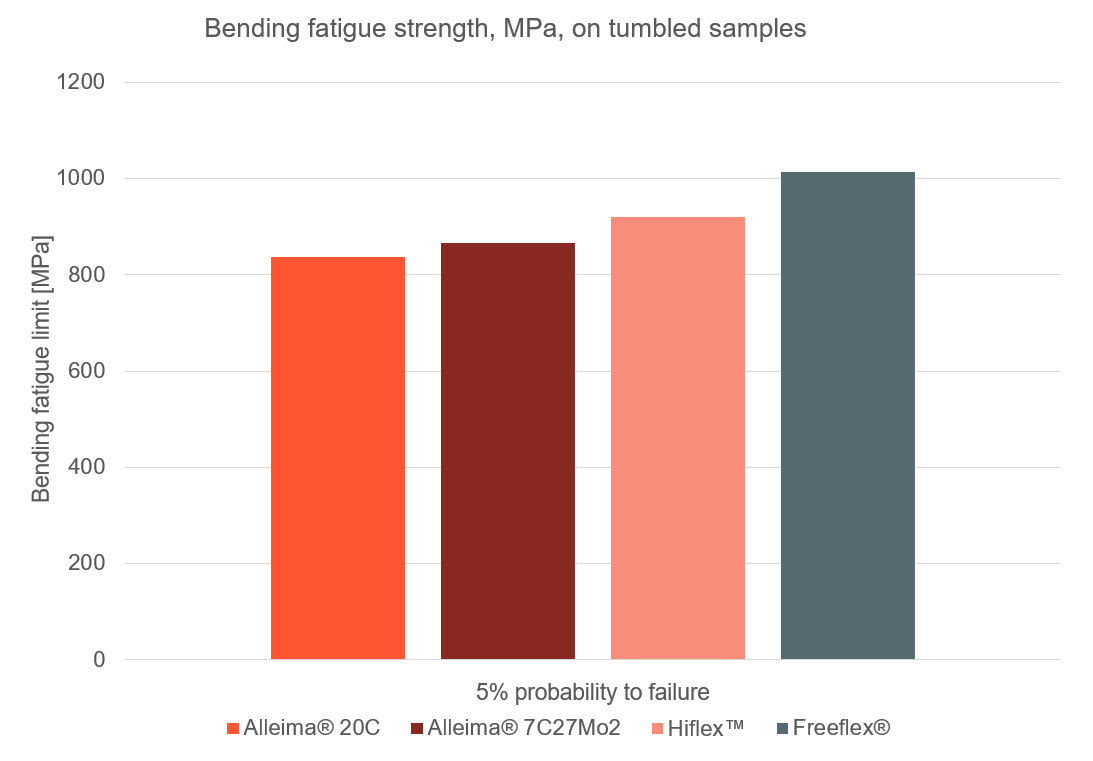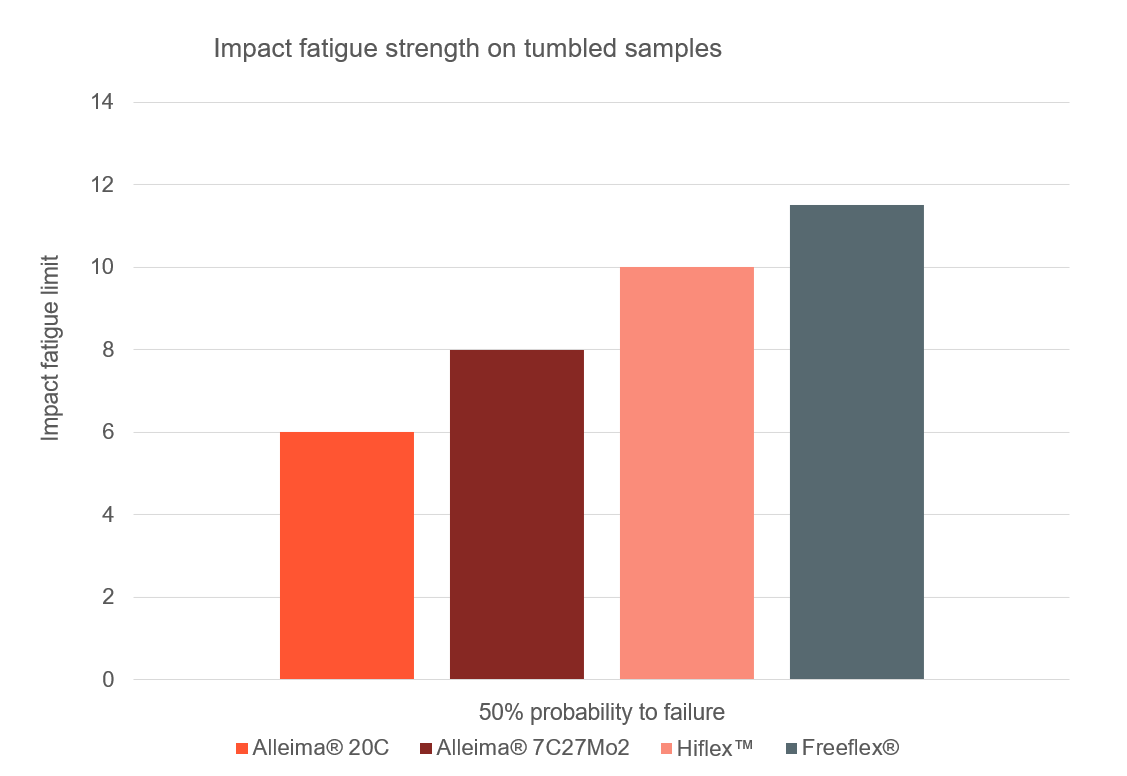Freeflex® is a hardened and tempered martensitic stainless compressor valve steel alloyed with copper. The material is characterized by:
- Excellent combination of high strength and high ductility
- Extremely high fatigue strength under bending and impact stress
- Excellent surface finish
- Very high compressive residual surface stress
- Low level of non-metallic inclusions
- Very good wear resistance
Freeflex® compressor valve steel has excellent dimensional tolerances and flatness.
Chemical composition (nominal)
| C | Si | Mn | P | S | Cr | Mo | Cu |
|---|---|---|---|---|---|---|---|
| 0.53 | 0.40 | 0.68 | ≤0.025 | ≤0.010 | 14.0 | 1.00 | 0.70 |
Applications
Valve types:
- Flapper valves
- Reed valves
- Check valves
Fabrication
Tumbling
A good tumbling operation giving a round, smooth edge is necessary in order to minimize stress concentrations. Tumbling also increases the residual compressive surface stresses which gives a significant further improvement in fatigue properties.
Finish
Edges
Edges are slit and deburred. Shaved edges can be supplied on request.
Flatness
Maximum out-of-flatness across and along the strip is 0.20% of the nominal strip width.
Surfaces
Maximum surface roughness values, cut-off 0.80 mm (0.031 in.), are shown in the table.
| Thickness [mm] | Thickness [in.] | Ra [µm] | Ra [µ in.] | Rmax [µm] | Rmax [µ in.] |
| < 0.152 | <0.006 | 0.13 | 5.2 | 1.5 | 60 |
| 0.152 - 0.508 | 0.006 - 0.020 | 0.10 | 4.0 | 1.5 | 60 |
| >0.508 | >0.020 | 0.25 | 10.0 | 2.5 | 100 |
Surface defects
A small number of surface defects, such as pits and roll marks, with a depth or height of 2 µm (80 µin.) maximum is allowed for thicknesses up to 0.508 mm (0.020 inch) and 3 µm (120 µin.) maximum for thicker material. The maximum scratch depth allowed is as follows:
| Thickness | Max. allowed depth | ||
|---|---|---|---|
| mm | in. | µm | µin. |
| ≤0.203 | ≤0.008 | 0.5 | 20 |
| >0.203-≤0.508 | >0.008-≤0.020 | 0.8 | 32 |
| >0.508 | >0.020 | 1.0 | 40 |
Straightness
Out-of-straightness is defined as the maximum deviation from a straight-edge of a specified length. The following values apply:
| Strip width | Max. allowed deviation | ||
|---|---|---|---|
| mm | in. | mm/m | in./3 feet |
| ≥-<20 | ≥0.315-<0.787 | 2.0 | 0.072 |
| ≥20-<50 | ≥0.787-<1.969 | 1.5 | 0.054 |
| ≥50-<125 | ≥1.969-<4.921 | 1.25 | 0.045 |
| ≥125 | ≥4.921 | 1.0 | 0.036 |
Mechanical properties
| Proof strength | Tensile strength | Elongation | ||||
|---|---|---|---|---|---|---|
| Rp0.05 | Rp0.2 | Rm | ||||
| MPa | ksi | MPa | ksi | MPa | ksi | % |
| nominal | nominal | nominal | ||||
| 1380 | 200 | 1600 | 232 | 2020 | 293 | ≥7 |
The values are valid for thicknesses up to 0.60 mm (0.024 inch). The manufacturing tolerance for tensile strength is ±60 MPa (±8.7 ksi).
Reversed bending fatigue (mean stress = 0)
The fatigue strength of Freeflex® compressor valve steel in reversed bending is ±1010 MPa (±146 ksi) at a failure rate of 5%.
Fluctuating bending fatigue (minimum stress = 0)
Fluctuating bending fatigue strength for Freeflex® has been calculated from reversed bending values at a 5% failure rate. Goodmans formula gives 674±674 MPa. Gerbers formula gives 838±838 MPa.
Comparison with other steel grades
Bending fatigue strength,MPa on tumbled samples


Physical properties
Density, 7.7 g/cm3, 0.27 lb/in3
| MPa | 210000 |
|---|---|
| ksi | 30500 |
Forms of supply
Conditions and forms of supply
Strip steel is supplied in labeled coils, or on labeled plastic spools, depending on weight and size. The label details the steel grade, heat, lot and coil number, and nominal size, allowing full material traceability. Material is protected against rust with oil.
Dimensions
Thickness
Freeflex® is supplied in standard thicknesses in accordance with the table. Customized thicknesses can be supplied on request.
| Thickness | Tolerances | ||
| Mm | in. | mm | in. |
| 0.152 | 0.006 | 0.005 | 0.00020 |
| 0.178 | 0.007 | 0.005 | 0.00020 |
| 0.203 | 0.008 | 0.006 | 0.00024 |
| 0.254 | 0.010 | 0.007 | 0.00028 |
| 0.305 | 0.012 | 0.007 | 0.00028 |
| 0.381 | 0.015 | 0.008 | 0.00035 |
| 0.406 | 0.016 | 0.012 | 0.00047 |
| 0.457 | 0.018 | 0.012 | 0.00047 |
| 0.508 | 0.020 | 0.014 | 0.00055 |
| 0.600 | 0.0236 | 0.020 | 0.00079 |
Width
Strip in standard thicknesses is stocked in widths up to 325 mm (12.8 in.), ready for slitting to the required width.
Disclaimer: Recommendations are for guidance only, and the suitability of a material for a specific application can be confirmed only when we know the actual service conditions. Continuous development may necessitate changes in technical data without notice. This datasheet is only valid for Alleima materials.